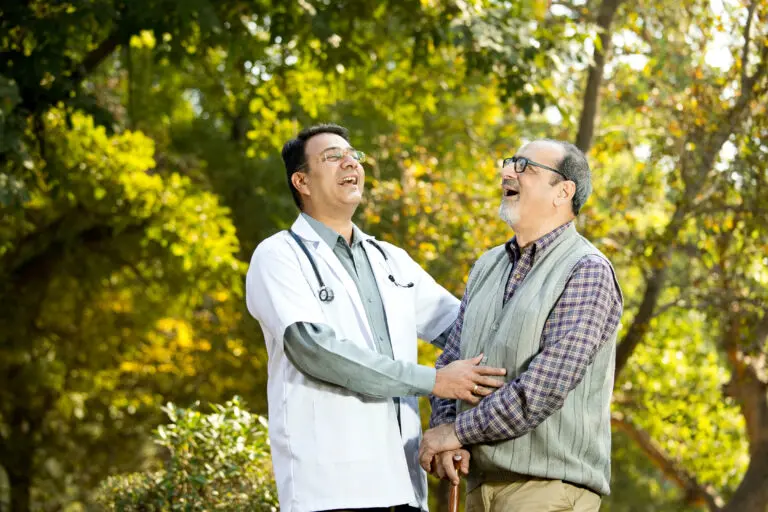


While age is a known risk factor for hypertension, its impact on the seriousness of the condition remains a subject of interest and investigation. Does age genuinely make a difference to the increase of hypertension?
Understanding the dynamics of hypertension and aging is crucial as you navigate the complex web of factors that contribute to cardiovascular health. People live longer these days, so exploring the implications of changes on blood pressure management with growing age, and its potential consequences, becomes essential.
With older people, physiological alterations can influence the development and progression of hypertension. Moreover, age is a backdrop to other influential factors such as genetics, lifestyle choices, and comorbidities, further complicating the relationship between age and hypertension intensity.
Let’s delve into the relationship between age and hypertension, exploring how the two intertwine and affect one another.
Hypertension is generally more common in older adults, and the risk of developing it does tend to increase with age. According to the Centers for Disease Control And Prevention (CDC), as you get older, your blood vessels may become less flexible and narrow, contributing to higher blood pressure.
Overall, older individuals with hypertension may experience more complications and have a higher risk of developing other related health conditions. These can include heart disease, stroke, kidney problems, and damage to other organs. The impact of hypertension on these organs and an individual’s overall health can be influenced by factors such as changes in the cardiovascular system with changing age, among other health parameters.
According to John Hopkins Medicine, however, it’s important to note that hypertension levels can vary among individuals regardless of age. Some older adults may have well-controlled blood pressure with minimal impact on their health, while others, including younger individuals, may experience more severe consequences.
Proper management of hypertension, including lifestyle changes, according to age – and additional medication if necessary – is essential to reduce the risk of complications. Regular check-ups and blood pressure monitoring are also crucial for individuals of all ages.
Some particular factors that contribute to the increase in hypertension with age include:
According to Hana Ames, writing in Medical News Today, as you age, your blood vessels may become less flexible and more rigid, leading to increased resistance to blood flow and higher blood pressure.
Aging can lead to a loss of elasticity in the arterial walls, making it harder for them to expand and contract to accommodate changes in blood flow. This can contribute to higher blood pressure.
The kidneys play a crucial role in regulating blood pressure. However, with age, kidney function may decline, affecting their ability to filter waste products and efficiently maintain fluid and electrolyte balance. This can contribute to a rise in hypertension.
According to Mayo Clinic, body changes in women during menopause, when there is a decline in estrogen levels, can affect blood pressure regulation. Further, menopause is associated with weight gain and changes in body composition, an increased risk of developing insulin resistance, and sleep disturbances and stress.
Over time, plaque, consisting of cholesterol and other substances, can build up in the arteries, leading to atherosclerosis. This narrowing of the arteries can contribute to higher blood pressure.
If you have a genetic predisposition to hypertension, it can manifest at an earlier age and progress more rapidly. You may experience a faster increase in hypertension as you age, compared to other patients without hereditary hypertension.
Lifestyle choices, such as maintaining a healthy diet, regular exercise, weight management, and avoiding tobacco and excessive alcohol consumption, can significantly influence blood pressure control. If you have adopted and maintained a healthy lifestyle throughout your life, you are more likely to have stable blood pressure levels as you age.

The age at which high blood pressure increases, and the extent of the progress, can vary among individuals and populations. However, there are some general patterns observed.
According to the American Heart Association (AHA), patterns for hypertension prevalence and increase can be different for aging men and women, as shown below.
(Do note that these estimates below provide a general overview, but individual circumstances may vary. Lifestyle factors, genetics, and overall health can influence the onset and progression of hypertension in different individuals.)
Men: Approximately 13% to 14% have hypertension.
Women: Approximately 7% to 8% have hypertension.
Men: Approximately 35% to 37% have hypertension.
Women: Approximately 26% to 29% have hypertension.
Men: Approximately 58% to 60% have hypertension.
Women: Approximately 63% to 65% have hypertension.
According to the National Institute on Aging, changes in the body, as a result of age, contribute to the increase in hypertension, it can be prevented or effectively managed through various strategies:
Adopting a healthy lifestyle can significantly reduce the risk and progression of hypertension. This includes maintaining a balanced diet rich in fruits, vegetables, whole grains, and lean proteins, reducing sodium intake, engaging in regular physical activity, maintaining a healthy weight, limiting alcohol consumption, and avoiding tobacco use.
Regular aerobic exercise, such as walking, swimming, or cycling, can help maintain healthy blood pressure levels and improve cardiovascular health.
Chronic stress can contribute to hypertension. So, adopting stress management techniques such as meditation, deep breathing exercises, and engaging in activities that promote relaxation can be beneficial.
Scheduled blood pressure monitoring allows for early detection and prompt intervention if hypertension is seen to be increasing. This enables timely management and reduces the risk of complications.
In some cases, even lifestyle modifications and the normal range of medications may not be sufficient, and extra medication may need to be prescribed to control blood pressure. Adhering to prescribed medications as directed by the doctor is essential for effective management.

By the time people age, other comorbidities can set in. Comorbidities are the presence of other severe health conditions that can significantly impact the development and progression of hypertension as individuals age.
Further, when individuals have one or more chronic health illnesses concurrently, such as obesity, cholesterol, diabetes, and hypertension (along with other hereditary factors), they can all have a multiplicative effect on the heart.
In such cases, management of all these ailments has to happen simultaneously. Regular checkups with your doctor will allow you to learn how to reduce bad cholesterol and increase good cholesterol, reduce obesity and weight gain, keep high blood pressure levels monitored and in check, and ensure consistent stability in blood sugar levels.
Some things grow better with age, but our bodies, unfortunately, don’t always follow this dictum. As we grow older, our acquired or hereditary diseases (like hypertension) progress with time. We must stay extra alert and monitor ourselves more frequently than before. We need to follow doctors’ orders more diligently. And we need to maintain stricter discipline than before over our regimens of diet, exercise, sleep, relaxation, and other lifestyle changes.
All this is as important to the hypertension itself as to the heart. But, with due self-care, you can age and still live a happy and full life. Stay heart-healthy. Be a Zinda Dil.